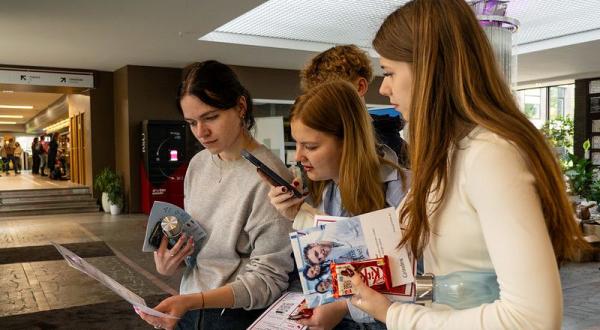METC Turns Into Simulated Hospital for Two Weeks
Rīga Stradiņš University (RSU) has implemented an unprecedented project in Latvian medical education – between 6 and 17 December, two floors of the the Medical Education Technology Centre (METC) were transformed into a simulated hospital. This simulation had a department of internal diseases, a department of surgery, as well as treatment rooms, a nurse post, and wards with mannequins and actors playing patients.
Around 90 third-year international medical students who have not been able to practice in their home countries due to the pandemic have undergone two weeks of clinical care practice at the simulated hospital. Practice in this kind of a format clearly demonstrates both the innovative approach of the RSU METC and the importance of simulation-based education in preparing specialists for their first contact with patients in a hospital.
In a hospital, processes related to patients are not divided into topics and classes, but several activities take place consecutively and often even at the same time. The simulated hospital at the METC works like a real hospital. The nursing post receives phone calls, calls are made to the wards, and patients are transported to examinations. It isn’t only technical skills that are important for working in a hospital, but being able to prioritise, communicate with patients and healthcare professionals, calculate dosages, educate and support patients, identify patients, and other non-technical skills such as these can be improved in our simulated hospital,’ says Ieva Šlēziņa, the Director of the RSU METC.
Šlēziņa points out that these two weeks were just the tip of the iceberg. It took several months to prepare everything necessary for the practice – to develop scenarios, prepare equipment, get actors to play patients who then needed to be trained, adapt the premises, and develop patient care documentation. As a result, even the smallest details have been thought out – there were ampoules with fake medication, artificial blood, faeces, urine, wounds, and even catheters were glued in place for administering medication.
The METC team has done an amazing job, both to prepare the simulation, and then also to endure the intense two weeks. The simulation started when the first shift of students arrived at work at 8:00, and the second worked from 14:00 to 20:00. It is very gratifying to see how the students managed to get into the hospital environment and learn,’ says Šlēziņa.
Although it is common for RSU students to train their preclinical skills, this is the first time in the history of the university that such a large-scale programme has been implemented, involving more than 30 patient actors. A total of 20 "patients" - eight well-equipped mannequins and 12 people who responded to METC's call - stayed in the "wards" every day. Finding and working with the actors takes a lot of work.
According to Sergejs Babikovs, lecturer at the RSU Department of Internal Medicine and a simulation instructor at the METC,
‘Each participant was prepared for their role according to a script, and everyone was highly motivated to maintain the illusion of a hospital. We had patients with puncture wounds, pancreatitis, and other ailments. This was an opportunity for the actors to get learn about the hospital in a safe way and gave an insight into how they work. It also gave them a chance to learn about various ailments and diseases. In addition, learning how to communicate with or without a language barrier was helpful for the students, but also for the actors to get to know future specialists from other cultures’.
‘Some actors had to be compliant whereas others had to be “challenging" patients. The students later said that some of the "patients" gave Oscar-worthy performances!’ adds Šlēziņa.
To implement the simulated hospital, the METC prepared patient documents, a patient safety case reporting system and a few patient assessment tools – order sheets, a Braden scale for pressure sore risk, a measure of patient activity, as well as fall risk assessment.
‘Documents and documentation of the care and treatment process are an integral part of the work of healthcare institutions. Understanding of these processes helps students prepare for work and practice in a real hospital with real patients. During the practice, students gain a better understanding of hospital processes. If a blood test needs to be taken, for example, the student must be able to find the designation on the order sheet, select the appropriate equipment, identify the right patient, explain the planned action before the manipulation, tidy up the work area after themselves, send the sample to the laboratory, and document their work,’ says certified nurse Madara Blumberga, METC Simulation-Based Education Development Manager in Nursing.
The RSU Department of Nursing and Midwifery played an important role to conduct simulated practice, including creating scenarios for patients and students successfully, especially the head of the department, Asst. Prof. Kristaps Circenis and lecturer Lilija Antoņeviča.
The simulation-based medical education for prospective doctors and nurses at RSU focuses on patient safety and the quality of healthcare and is divided into four stages: theoretical lectures, practical classes, preclinical practice in a simulated hospital like the METC, and only then working with patients in a real hospital.
Latvian Television programme “Panorāma”: "The first simulated hospital for medical students” (18 December 2021) - in Latvian




